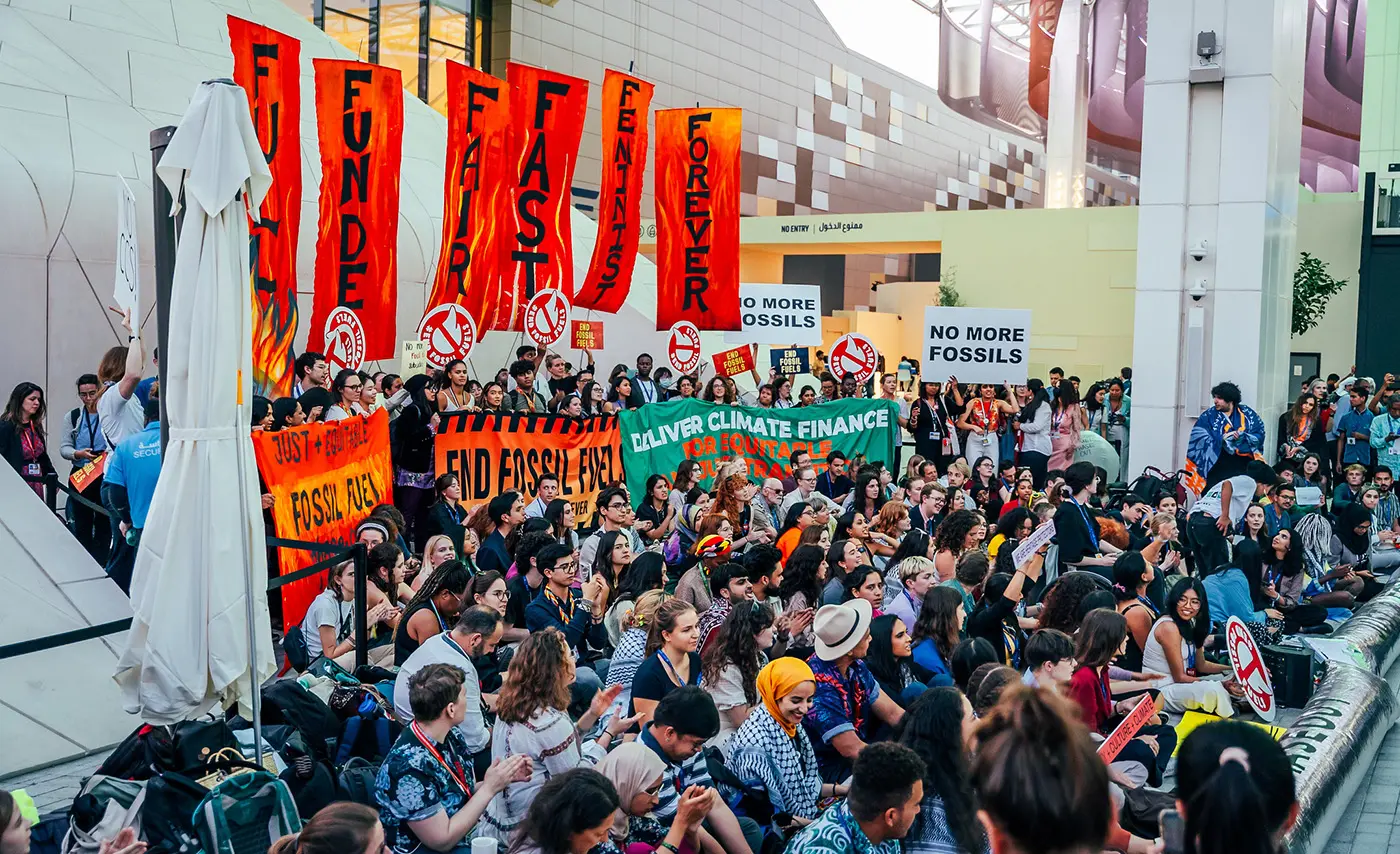
“End Fossil Fuels” protest at COP 28 on Dec. 12, 2023 in Dubai (Photo: Konrad Skotnicki/MídiaNINJA via Flickr)
Last December I found myself dashing through the hot smoggy haze of Dubai in the United Arab Emirates around a sprawling hyper-modern venue to debate the future of the planet. Welcome to COP 28, the United Nation’s annual Climate Change Conference: Take 28.
Oil refineries, skyscrapers and super highways formed a dissonant backdrop to this a conversation, while nature itself was noticeably absent — a few valiant scrawny palms waved in the desert breeze.
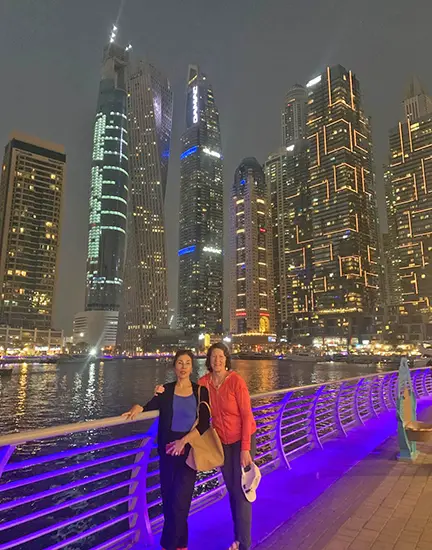
Lisa (right) with Gina Castillo, climate lead for CRS, in front of the Dubai skyline
But diversity in the human form was in regal display: saris, kanduras, kangas, abayas and feathers formed a lovely foreground to the desert, rounded out by my own boring grey. We were an impressive collection of all ages, sizes and colors.
But we did have one common denominator that drew us all there: Our Common Home. And it made its voice heard loudly. As COP 28 was beginning, Planet Earth was just concluding its hottest year on record.
The path to my participation at COP 28 — like that of many others — was not a straight line. My love for the earth led me to passionately grow food with children as a response to the hunger crisis in my adopted nation of Venezuela. Which brought me face to face with unusual cycles of drought and the culprit of climate change. When a role for environmental advocacy opened up at the Maryknoll Office for Global Concerns, I felt the call. Given that Maryknoll has observer status with the U.N., it was a privilege to fill its chair at this amazing event, along with my colleague Maryknoll Sister Susan Nchubiri, whose indefatigable spirit kept me going.
Each of us in this motley collection of global citizens brought something unique to this multi-faceted debate. Most stood in defense of the planet. But some stood in defense of their — and their bosses’ — pocketbooks (some 2,400 fossil fuel lobbyists attended). A handful had the power to make actual decisions.
One of them was the man gaveling the conference to order, COP 28’s President Sultan Al Jaber, who also happens to be the head of his nation’s national oil company, which pumps some 3.2 million barrels of oil daily. Many likened his appointment to putting the fox in charge of the henhouse. Others insisted he was uniquely positioned to bring oil-producing nations to necessary agreements.
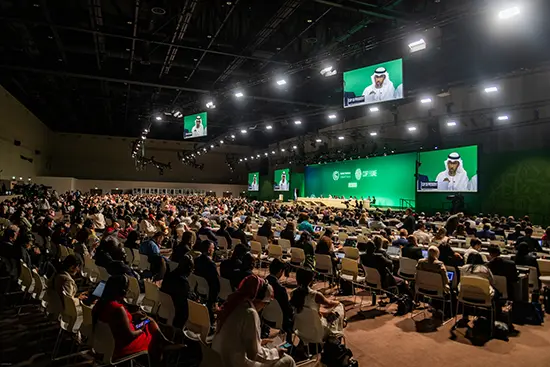
Sultan Al-Jaber addressing the plenary of COP 28 (MídiaNINJA via Flickr)
In spite of abundant pessimism regarding the venue and its captain, Day 1 of COP turned out to be a very good one, with Al-Jaber overseeing a unanimous decision to approve the so-called Loss and Damage Fund. This is a new financial vehicle to aid vulnerable nations who are already experiencing climate change’s devastation yet have done the least to contribute to its cause. It was an issue which I had followed and advocated for fiercely, and thus was keenly aware that it was teetering on failure. Receiving news of this victory only hours after entering the COP venue put Susan and me in a very merry mood.
Like so many justice victories, this one was years in the making. Perhaps the COP president received the applause, but its origin came from the sidelines. One of the main heroes of this noble cause died shortly before it came to fruition. Saleemul Huq, a Bangladeshi scientist, had led the charge, beginning many years ago, alongside many climate justice activists and affected communities. It was a reminder to me that, although all eyes are on the official negotiation at COP, it is the many dedicated climate scientists and climate justice activists who raise both the issues and the solutions that eventually come to the negotiation tables.
This early success encouraged me to fully embrace all parts of COP. Ideas, dialogue and solutions were percolating from all corners: side events, meetings, marches, vigils, forums. I helped with two side events on Loss and Damage and also attended dozens of others, learning and gleaning inspiration from so many: scientists, young activists from the global South, indigenous on the front lines as well as numerous faith leaders who are increasingly taking a vital role on the global climate stage.
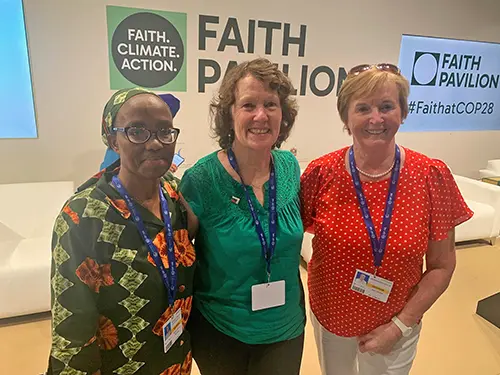
At the COP Faith Pavillion, with Maryknoll Sister Susan Nchiburi and Sister Jean Quinn, President of UNANIMA.
Still, all eyes were on the country negotiators and their decisions. And it soon became clear that the one decision that would redeem this COP process and keep the globe coming together to solve its common problem was this: A phase-out of fossil fuels. Beyond all reason, there have been 27 years of COPs, and yet the elephant in the room had not been named. Fossil fuels bear 80% of the responsibility for climate change, yet have never been called out in any previous COP decision.
Over the two weeks, the call for phasing out of fossil fuels grew louder and louder. From countries whose very existence is threatened by climate change — like Pacific Island nations — a call for a fast, full, fair and free phase-out resonated. From those countries whose economy was built on pumping oil, push back was strong. In the middle stood countries like the U.S., vying for a compromise.
Once again, a decision came in the 11th hour. As Susan and I were boarding our plane, I received a text with the final unanimous decision of the body to “transition away from fossil fuels.” I know that it is not the perfect phrase, nor contained all the important adjectives. And there are so many loopholes. But still, I confess that a tear or two fell upon reading that. It buoyed my hope that perhaps the global community together can turn the ship around before it’s too late.
COP is not the only place where the hard work of saving our planet is undertaken. That history is written daily in the ordinary and extraordinary choices of millions. My real privilege is knowing so many of them: Like returned Maryknoll lay missioner Marilyn Kott (Class of 2015 – Brazil), whose informative worksheets help parishioners become earth stewards. Or Glenn Rabut, another returned missioner (Class of 1997 – Venezuela), who decided to bike to work each day — 20 years in a row. Or returned missioner Cathy Rowan (Class of 1987 – Brazil and U.S.), whose detailed efforts guide shareholders to call fossil fuel companies to task. Or Maryknoll Sister Pat Ryan, whose tireless efforts are protecting the shores of Lake Titicaca. Or Maryknoll Sister Melinda Roper, whose fierce determination is returning biodiversity to a shrinking jungle.
¡Gracias amigos y pa’lante!

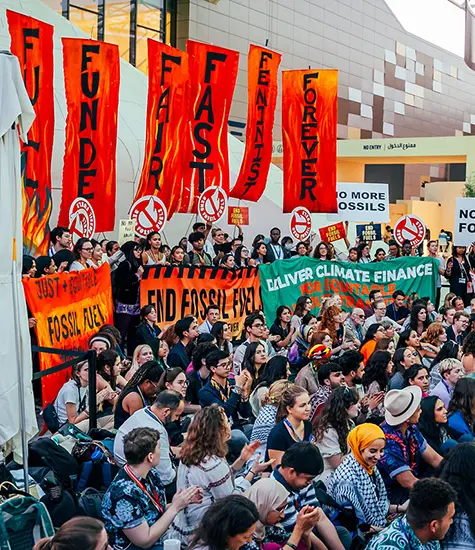

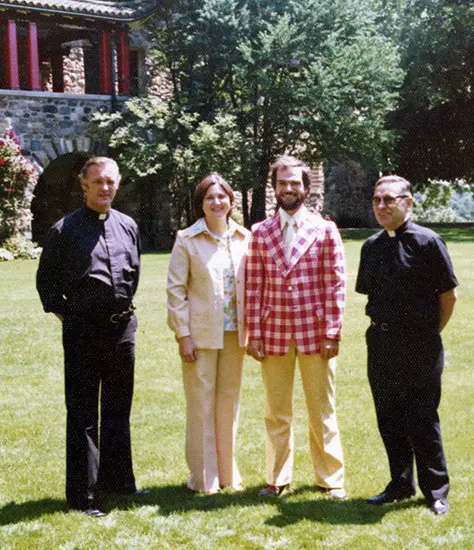
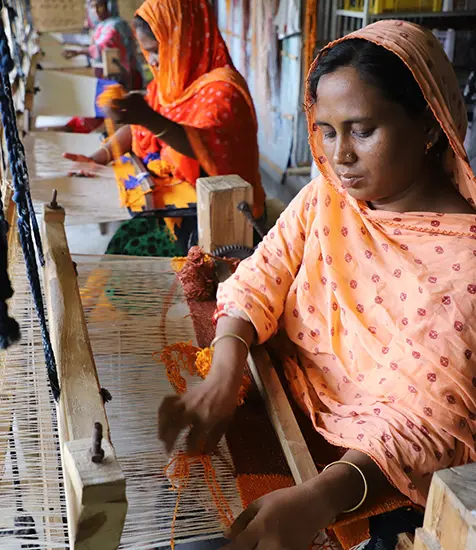
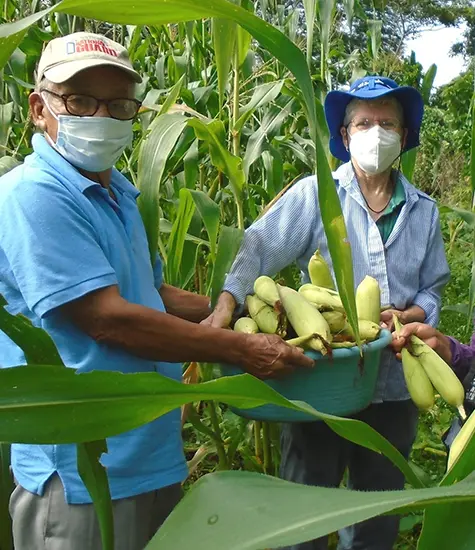




I am immensely grateful for this report, Lisa!! And for your tremendous dedication…. I am convinced that we here at the grassroots are helping to bring about a deep change in who we are as a species. This is the “cry of the Earth” awakening in us that becomes ever louder as the climate crisis deepens. Perhaps it is time to re-define Maryknoll´s mission as keepers of Earth….
Thanks Lisa for the work you and Susan did and this report. I am not a big fan of these types of meetings. I have been through Dubai on my way home to the USA from Kenya and I wouldn’t want to pass that way again. But knowing you, and reading what you wrote, makes me realize I need to be more open and listen more carefully.